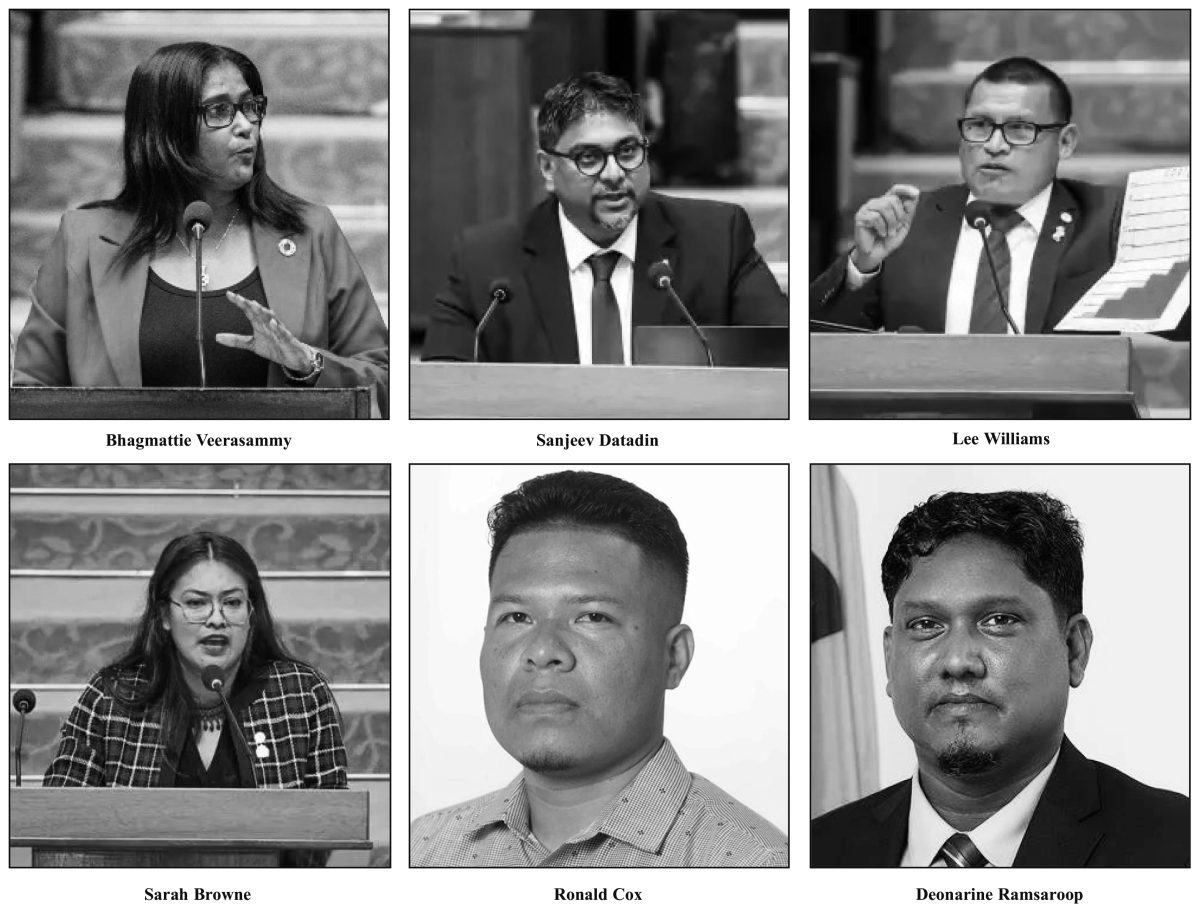-Speaker cracks the whip
By Milton Grannum
Day one of the 2025 budget debate saw intense exchanges between Government and Opposition backbenchers over the provisions made in the estimates of expenditure and areas where improvements could have been made.
Parliamentary Secretary in the Ministry of Amerindian Affairs, Sarah Browne, defended the measures implemented to support Indigenous communities. She praised the government’s efforts, stating, “Firstly, I must commend His Excellency Dr. Mohamed Irfaan Ali and his cabinet for ensuring manifesto promises are fulfilled.” However, her comments were interrupted by Speaker of the National Assembly, Manzoor Nadir, who reminded her that the Standing Orders do not allow members to address the President in the National Assembly.
Minister of Parliamentary Affairs and Governance, Gail Teixeira, rose to Browne’s defence, saying, “Mr. Speaker, I believe I will have to write a long memo on this issue. The Standing Order 41 in regard to the president, the president is the head of the parliament, so therefore it is impossible in the National Assembly for a government or anybody else to refer to the president, who is the head of the government and also the head of the parliament. What the Standing Order says at 41:8 is if you are using the name of the president to influence the parliament, but a statement of fact that the president said so, and so…” Before she could finish, the Speaker interrupted and cut her microphone, asserting that he decides how the Standing Orders are applied.
During the exchange between the two, Minister Kwame McCoy heckled, prompting the Speaker to respond, “Honourable Member Mr. McCoy, you can always bring a no-confidence motion against me and put the parliament where you want it to be.”
Browne, who had faced a lengthy legal objection from the opposition to her presence in Parliament, continued her defence of the government’s policies, “We did not only rehire the 2,000 CSOs (Community Service Officers) that were dismissed by the APNU-AFC, which they did not apologize for, but we increased the numbers and raised the stipend from $30,000 to $40,000.”
Not fired
Opposition member Deonarine Ramsaroop countered, during his presentation saying, “The CSOs were not fired. What we found was many of them were hired by political parties and were doing political work. There were a lot of complaints from communities that the work given was not done.”
Ramsaroop’s presentation then shifted to the forestry sector, calling for increased support for technology upgrades, reduced costs, better access to financing, and enhanced training. He also questioned the management of funds from the Hess Corporation agreement, which provided $750,000 USD for carbon credits.
“What happens to the remaining 70 percent of carbon credits? Hess purchased 30 percent of the credits. I told the honourable member Vickram Bharrat (Minister of Natural Resources) that we need to remodel the carbon credit scheme because if you are paying for carbon credits, you must have an idea as to where you are buying this credit, and that was absent.” This prompted a heckle from Opposition member Ganesh Mahipaul: “Yuh hear that, Vickram?”
Government member Sanjeev Datadin followed with a focus on the oil and gas sector. He noted, “Guyana has unprecedented economic growth and continues over the years. It is driven by, principally and in large part, our petroleum sector. Revenues are carefully managed and spent to improve our petroleum sector. Since the local content act introduced by this government came into force, more than 1,100 companies have applied and obtained local content certificates. That means there are 1,100 companies involved in the petroleum sector that are at least 51 percent owned by Guyanese people. In 2024 alone, that accounts for revenue of $620 million USD.”
Datadin’s presentation was met with opposition heckles calling for renegotiation of the petroleum sharing agreement.
APNU+AFC MP Ronald Cox rebutted much of Browne’s earlier points, arguing that the government should not rely heavily on the oil sector but instead diversify the economy. “It is imperative that we concentrate on diversifying our economy by supporting small businesses and, of course, agriculture, like in my region,” he said. He called for increased investment in tourism, manufacturing, agriculture, and other sectors, noting the rising cost of living and inflation. “In Guyana, the cost of living has skyrocketed, and we cannot ignore that. Many citizens cannot afford their basic needs. The important problem of inflation and how it affects the working class is not addressed in the proposed budget. Simply promising tax breaks or subsidies is insufficient. We also need to take action in lowering the cost of certain products.”
Government member Lee Williams responded with a presentation supported by visual graphics. “The People’s Progressive Party Civic, since taking office, reintroduced the Community Support Officers (CSO) programme, and to date, over 2,700 youth are benefiting from this initiative. The government has increased their stipend by 33.3 percent, from $30,000 to $40,000. Amerindian development is vital to the PPP/C government.” He highlighted the allocation of over $9.5 billion to Amerindian villages through the Low carbon development strategy funds and the installation of Wi-Fi centres in Indigenous communities.
Government member, Bhagmattie Veerasammy closed the day by endorsing Williams’ comments and reiterating the government’s accomplishments, specifically those geared at the Health and Human services ministries. She noted, “The budget offers goodwill, increased wages, salaries, improved conditions of living, entrepreneurship, job creation, and so much more. This budget will ensure our people live longer and healthier lives.”










